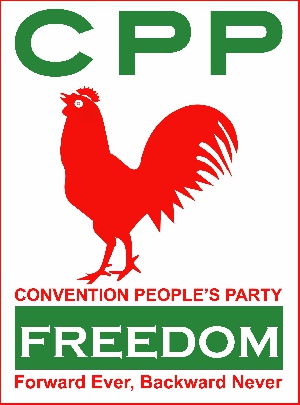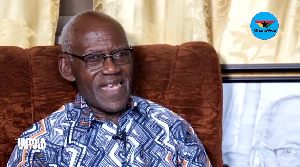- Home - News
- TWI News | TV
- Polls
- Year In Review
- News Archive
- Crime & Punishment
- Politics
- Regional
- Editorial
- Health
- Ghanaians Abroad
- Tabloid
- Africa
- Religion
- Election 2020
- Coronavirus
- News Videos | TV
- Photo Archives
- News Headlines
- Press Release
General News of Wednesday, 6 March 2013
Source: CPP
CPP response to 'Yen Tumi Kraa Budget'
PRESS RELEASE
Finance Minister Seth Tekper summed up in his closing remarks when he said “I believe in solving problems when it confronts us.
The CPP would wish that he and the NDC Government will rather plan to avoid problems. His words sum up an approach which has led to Ghana’s current crisis, a failure to plan.
On The Back of huge stresses in our economy - Recent Petroleum Prices, erratic water and electricity supply, LPG shortages, rising production costs to companies and industry, all of which will make it difficult for employers to increase salaries for workers.
The “YEN TUMI KRAA BUDGET” proposes to raise taxes to add to the hardship of our citizens.
Overall this is a budget demonstrating government inadequacy on its development mission and objective.
The government’s monetary policy expenditure cuts is not only medieval but for 30years has not worked to revive the depressed economy. The proposition of current economics science is that short term monetary expansion is the road for the achievement of long term stability and deficit reduction.
We call on the Finance Minister to revise his notes. He should understand that his purpose in the management of the economy is to demonstrate that we are capable as a nation to steer and manage our affairs and would not submit to policy dictates in exchange for donation or so called development assistance.
Our economy remains stuck in “fiscal consolidation” mode, when will it enter development mode?
Total revenue and grants was below target but expenditures were higher than the budget estimate leading to a fiscal deficit of 12.0 per cent of GDP, against a target deficit equivalent to 6.7 per cent of GDP.
Agriculture and Industry both grew below target, with the service sector marginal performing above target.
Interest rates remain too high, and still hugely a reflection of banking inefficiencies, making it harder for businesses to access credit at reasonable rates, and thus depressing growth.
The budget offers no immediate solution on the water and electricity crisis. Much of it was a repetition of intensions. The government proposes “as a priority over the medium term, to ensure that all primary, junior and senior high schools in the country have access to clean and potable” water, against a backdrop of failure to deliver uninterrupted water to homes.
The national debt has reached a staggering Ghc35billion, representing close to 50% of GDP, and speeding recklessly towards another HIPC. This figure will be bearable if Ghanaians can fully understand, see and feel the benefits. Borrowing must be channelled into productive investment which will ultimately reduce our deficit.
Ghana, the land of plenty, blessed with gold, diamond, bauxite, manganese and oil etc. still needs to beg to function, as self – sufficiency in the energy sector is to be subjected to the 2nd
Compact of the Millennium Challenge Account.
In a country blessed with arable lands, plants of medicinal value, the benefit and a huge potential of rivers, the most important resource of Ghana, her people, remains unemployed, hungry and thirsty in the midst of plenty, and the “YENTUMI BUDGET” fails to note Employment as a major part of its programme.
The Budget notes the Government Programme as – to maintain a Single Digit Inflation; ensure exchange rate stability; reduce the deficits significantly; and maintain high annual economic growth rates. Overall average GDP growth will be supported by strong infrastructure development, particularly in the oil and gas sector.
The CPP notes that we need to ensure that Ghana’s growth which is often heavily influenced by mining and oil is meaningful and must not become a measure of increased extraction of our resources and increased profits for foreign or off-shore interests.
Malaria remains the number one killer of children in Ghana, yet the filth and open sewage remains and our sanitation one of the worst in the region but Government is now seeking to finalise a national infrastructure plan that it says “will align key components of the economic expansion with optimum access to needed infrastructure”.
Our human and natural resources must be fully tapped to stop Ghana from becoming a HIPC country. We must halt the over reliance on donor countries hich currently means over 40% of our budget is donor funded. This budget fails to address the issue.
Though our Electricity grew by 12% this is meaningless against the current crisis and has not ended "DUMSO! DUMS0! in Ghana.
Our railways have virtually collapsed and the noted rehabilitation works remain painfully slow. This under-development cannot be a measure of a middle income economy.
The approach of a CPP Government therefore would be the development of an internal capacity for the achievement of an internally sustained growth through the development of the productive resources of the nation to create employment and eradicate the structural deficits that underlie our poverty.
We have solutions to the deficiencies of the budget with an alternative path to development – increased investment in agriculture to feed the nation and build real food security, massive Industrialization linked with our rural economic activities.
These would necessarily include the following:
· The diversification of the agricultural export commodity sector that will necessarily include the development of the coffee, sheanut and sugar industries.
· The development of domestic construction materials such as glass, aluminium and brick and tile industry to substitute imports in the long term.
· A policy initiative for the development of our food and raw material agriculture as the necessary step for the achievement of food security and industrialisation.











